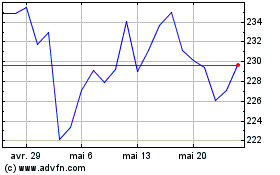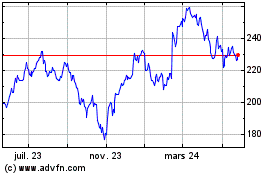IQVIA Institute: Innovative Therapies and Strong Pipeline to Combat Rise in Cancer Diagnoses
10 Juin 2024 - 2:00PM
Business Wire
- Cancer incidence is expected to rise significantly through
2050, particularly in lower-income countries, to 32 million new
cases annually – a potential increase of more than 12 million new
annual cases
- Global spending on cancer medicine increased to $223 billion in
2023, $25 billion more than in 2022, and is projected to reach $409
billion by 2028
- In 2023, 25 oncology novel active substances (NASs) were
launched globally, reaching a total of 193 since 2014 – however,
large geographic variations exist in availability of these
medicines
- More than 2,000 new oncology clinical trials started in 2023
with novel modalities and significant promise for cancer treatment,
including cell and gene therapies, antibody-drug conjugates,
multispecific antibodies, and radioligand therapies
- Cancer treatments have increased 9% annually since 2019 but the
pace of bringing novel therapies to patients is uneven due to
differences in biomarker testing rates, adoption of novel therapies
and lack of infrastructure capacity to deliver some of the most
advanced therapies
As cancer incidence continues to rise, it’s being met by wider
use of innovative therapies and a robust pipeline of new drugs,
according to a new report from the IQVIA Institute for Human Data
Science titled, “Global Oncology Trends 2024: Outlook to 2028.”
“The global oncology ecosystem is operating near peak levels to
address increasing challenges. New therapies for advanced cancers,
including some of the most advanced novel science in the industry,
are under development or have been recently launched,” said Murray
Aitken, Executive Director, the IQVIA Institute for Human Data
Science. “These therapies represent the largest area of collective
research and drug spending across all of healthcare. Yet despite
significant advances in treatment and better access to care, the
global oncology community and patients continue to struggle with
disparities in access and care.”
A few key highlights in the report include:
- Trends in cancer incidence and mortality: Cancer
incidence is expected to rise significantly through 2050,
particularly in lower-income countries, to 32 million new cases
annually – a potential increase of more than 12 million new annual
cases. The growing disease burden underscores the urgent need for
new treatments to enhance survival and quality of life. Disparities
in five-year cancer survival across countries with similar GDP
levels indicate that different healthcare strategies may lead to
better outcomes for certain cancers. The variability in cancer
severity and progression, along with healthcare system differences,
suggests that tailored strategies, such as focusing on early
detection or enhancing survivorship and quality of life, could be
more effective for certain cancers.
- Oncology research and development activities: In 2023,
more than 2,000 oncology trials started, fewer than the past two
years of rebounding from the COVID-19 pandemic and 11% higher than
in 2019. Emerging biopharma companies accounted for 60% of these
trials, a significant increase from 33% in 2013. Novel modalities,
including cell and gene therapies, antibody-drug conjugates (ADCs)
and multispecific antibodies, show significant promise for cancer
treatment and represent a growing share of clinical research.
Trials involving PD-1/PD-L1 inhibitors grew 29% over the last five
years, investigating across more tumors and in earlier lines of
therapy. More than 250 trials testing CAR T-cell therapies in
oncology started in 2023 and while the majority investigated for
hematological cancers, the therapies were increasingly viewed
across a range of solid tumors. Fifteen ADCs have been approved
globally and the number of ADC trials grew 26% from 2022 to 2023 as
more companies invested in these targeted chemotherapeutics.
Development of these novel treatments is being accelerated by
regulator and industry initiatives, including the use of artificial
intelligence to advance new therapies.
- Oncology clinical development productivity: The oncology
composite success rate increased to 10% in 2023 from 4% the year
prior, with improvements across all phases, especially in rare
oncology and solid tumor research. While oncology trials remain
complex, their level of complexity – a comparison of a number of
factors, including the number of countries, sites, patients,
eligibility criteria, and clinical endpoints – has decreased by 8%
since 2019, in contrast to a 2% increase in complexity for other
disease areas. The number of subjects enrolled in oncology trials
is down 11% in 2023 from the peak in 2021. Western European
countries are included in trials the most often, although China and
North American country inclusion has increased significantly in
recent years. Despite a reduction in trial durations, the overall
length of all oncology programs was only shortened by an average of
five months due to an increase in the time between trial completion
and starting the next phase. Improved success and declining
complexity resulted in a 23% improvement in productivity in
oncology clinical development in 2023.
- Novel active substances (NASs) in oncology: In 2023, 25
oncology NASs were launched globally, reaching a total of 193 since
2014 – however, large geographic variations exist in the
availability of these medicines. The number of NAS launches in
China over the last five years exceeded those in the U.S. While
many of these new medicines in China are driven by domestic
innovation, most have previously launched globally. New medicine
launches in Europe have slowed, resulting in delays in the
availability of innovative medicines compared to the U.S. – 38% of
U.S. oncology NASs in the past 10 years are not yet available in
Europe. Eighteen new cancer medicines were introduced in the U.S.
in 2023 and these new drugs are largely targeting rare cancers, are
recombinant and are often approved based on a single clinical
trial. The European Medicines Agency approved eight NASs for
hematological cancers and five for solid tumors in 2023, fewer than
the 14 approved in 2022.
- Cancer patient access and use of scientific advances:
The total number of cancer treatment regimens provided globally –
defined as the number of patients treated with a regimen in a time
period, whether one cycle or multiple – has increased by an average
of 9% annually since 2019 due to higher cancer rates and better
access to care. Despite this growth, the pace of novel cancer
therapies arriving to patients is uneven across countries, with
differences in biomarker testing rates, adoption of novel
therapies, and the lack of infrastructure capacity to deliver some
of the most advanced therapies. Treatment of women’s cancers,
prostate cancer and late-stage multiple myeloma has advanced in
recent years as novel modalities, including antibody-drug
conjugates, radiopharmaceuticals, bispecifc antibodies and CAR
T-cell therapies have been introduced – providing better outcomes
for patients.
- Spending on oncology medicines: Global spending on
cancer medicine increased to $223 billion in 2023, $25 billion more
than in 2022, and is projected to rise to $409 billion by 2028.
This growth is attributed to the volume of protected brands and the
introduction of new products in the past five years, despite losses
of exclusivity for some treatments. Biosimilars have been widely
adopted in major markets, leading to significant cost savings.
Notably, six major tumor categories experienced double-digit growth
in spending due to breakthrough medicines and improved patient
access. PD-1/PD-L1 inhibitors, which are widely used in solid tumor
treatments, accounted for $52 billion in spending in 2023, with
expectations to increase to more than $90 billion by 2028. The
future of next-generation biotherapeutics in oncology is marked by
clinical and commercial uncertainties, yet annual spending could
still potentially rise from $4 billion to $23 billion by 2028.
About the IQVIA Institute for Human Data Science
The IQVIA Institute for Human Data Science contributes to the
advancement of human health globally through timely research,
insightful analysis and scientific expertise applied to granular
non-identified patient-level data.
Fulfilling an essential need within healthcare, the Institute
delivers objective, relevant insights and research that accelerate
understanding and innovation critical to sound decision making and
improved human outcomes. With access to IQVIA’s institutional
knowledge, advanced analytics, technology and unparalleled data,
the Institute works in tandem with a broad set of healthcare
stakeholders to drive a research agenda focused on Human Data
Science, including government agencies, academic institutions, the
life sciences industry, and payers. More information about the
IQVIA Institute can be found at www.IQVIAInstitute.org.
About IQVIA
IQVIA (NYSE:IQV) is a leading global provider of advanced
analytics, technology solutions, and clinical research services to
the life sciences industry. IQVIA creates intelligent connections
across all aspects of healthcare through its analytics,
transformative technology, big data resources and extensive domain
expertise. IQVIA Connected Intelligence™ delivers powerful insights
with speed and agility — enabling customers to accelerate the
clinical development and commercialization of innovative medical
treatments that improve healthcare outcomes for patients. With
approximately 87,000 employees, IQVIA conducts operations in more
than 100 countries.
IQVIA is a global leader in protecting individual patient
privacy. The company uses a wide variety of privacy-enhancing
technologies and safeguards to protect individual privacy while
generating and analyzing information on a scale that helps
healthcare stakeholders identify disease patterns and correlate
with the precise treatment path and therapy needed for better
outcomes. IQVIA’s insights and execution capabilities help biotech,
medical device and pharmaceutical companies, medical researchers,
government agencies, payers and other healthcare stakeholders tap
into a deeper understanding of diseases, human behaviors, and
scientific advances, in an effort to advance their path toward
cures. To learn more, visit www.iqvia.com.
View source
version on businesswire.com: https://www.businesswire.com/news/home/20240610612636/en/
Kerri Joseph, IQVIA Investor Relations (kerri.joseph@iqvia.com)
+1.973.541.3558
Trent Brown, IQVIA Media Relations (trent.brown@iqvia.com)
+1.919.780.3221
IQVIA (NYSE:IQV)
Graphique Historique de l'Action
De Nov 2024 à Déc 2024

IQVIA (NYSE:IQV)
Graphique Historique de l'Action
De Déc 2023 à Déc 2024


